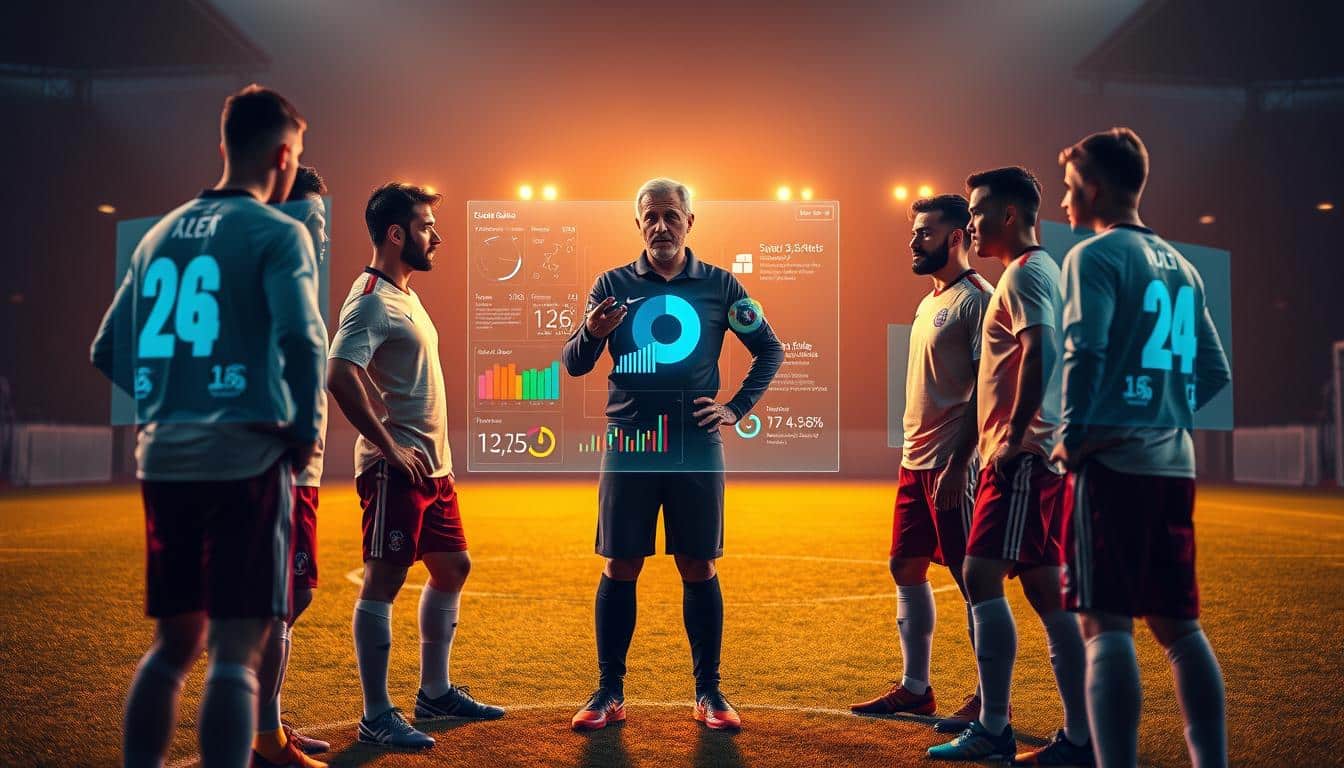Post-Game Reflection for Soccer Teams

What if five minutes could transform how your athletes grow? Whether you’re guiding new talent or seasoned competitors, structured self-analysis after matches unlocks hidden potential. This simple habit helps players pinpoint what worked, what didn’t, and how to adapt—without fixating on mistakes.
Imagine athletes who actively drive their progress, celebrate small wins, and tackle challenges with clarity. Coaches who foster this mindset see sharper decision-making, stronger communication, and a culture where improvement matters more than perfection. It starts with consistent, intentional reflection.
Key Takeaways
- Five-minute reflections boost skill development and team unity
- Structured feedback shifts focus from perfection to measurable growth
- Players gain confidence by articulating strengths and growth areas
- Coaches build accountability through systematic review methods
- Resilience improves when athletes embrace progress over flawless results
Understanding the Value of Post-Game Reflection
Consistent analysis after matches builds more than skills—it shapes resilient athletes and insightful leaders. When athletes pause to review their performance, they uncover patterns that fuel smarter decisions next time. Coaches gain clearer insights too, helping them tailor training to what players truly need.
| Benefit Area | For Players | For Coaches |
|---|---|---|
| Skill Development | Identifies technical strengths & gaps | Reveals training priorities |
| Communication | Articulates growth areas confidently | Receives actionable feedback |
| Accountability | Owns progress through self-assessment | Builds trust through focused guidance |
Benefits for Players
Regular reviews help athletes spot what worked during the game and why. They learn to celebrate small wins, like better passing accuracy, while framing mistakes as fixable challenges. Over time, this builds mental toughness—a simple way become more adaptable under pressure.
Benefits for Coaches
When players share specific observations, you discover simple adjustments for future drills. This feedback loop makes practices more efficient. You’ll also notice athletes taking initiative, which is the way become effective leaders both on and off the field.
Establishing a Daily Reflection Routine
Building habits requires structure, not just good intentions. A simple way become better at analyzing performance is to design routines that fit different personalities. Some athletes thrive when reviewing actions right after the final whistle, while others need space to process outcomes calmly.
Tips for Immediate Post-Game Analysis
Encourage athletes to jot down three quick observations before leaving the field. This takes two minutes but captures crucial details they might forget later. Use prompts like “What felt effortless today?” or “Where did momentum shift?” to guide focused thinking.
Maintaining Consistency in Reflection
Schedule specific time slots for reviews—like 10 minutes post-game or during next-day warm-ups. Treat these sessions with the same importance as practice drills. Over weeks, this rhythm turns analysis into second nature.
| Timing | Best For | Key Benefit |
|---|---|---|
| Immediate | Retaining fresh details | Captures raw emotions & instincts |
| 24-hour delay | Objective evaluation | Reduces frustration bias |
| Pre-practice | Connecting lessons to action | Links reflection to improvement |
Rotate between group discussions and private journaling to keep the process engaging. You’ll discover simple patterns in how athletes learn best. The goal isn’t perfect answers—it’s creating a way to measure growth that feels natural, not forced.
Using Video Analysis in Your Reflection
What if you could see every critical play from multiple angles? Video tools turn guesswork into clear insights. By recording matches, you capture unfiltered evidence that reveals patterns even seasoned observers might miss.
Capturing Key Moments on Video
Focus your recordings on pivotal moments like transitions between offense and defense. Use a smartphone or dedicated camera to film entire games, then tag timestamps for quick access. This saves hours during soccer coach weekly review sessions.
Enhancing Objectivity Through Playback
Watching replays helps athletes compare their memory with reality. A player who thought they made perfect passes might spot positioning errors. Coaches gain concrete examples to discuss tactical adjustments without personal bias.
| Video Benefit | For Players | For Coaches |
|---|---|---|
| Bias Elimination | See actual movement patterns | Provide neutral feedback |
| Skill Verification | Confirm successful techniques | Identify coaching priorities |
| Progress Tracking | Compare current vs past performance | Measure training effectiveness |
Schedule soccer coach weekly video sessions to maintain momentum. Rotate between analyzing standout plays and subtle mistakes. This balanced approach keeps your team focused on growth, not just outcomes.
Creating Actionable Insights for Improvement
Clear goals turn raw data into real progress. Help your athletes move beyond “I tried harder” to measurable actions that drive results. Start by aligning their observations with what they’ve worked on in practice throughout the season.

Setting Clear Reflection Goals
Ask specific questions that link game performance to pre-set objectives. Instead of “Did we play well?” try “How many planned passing sequences did we execute?” This way become effective at turning intentions into trackable outcomes.
| Effective Goals | Vague Goals | Why It Works |
|---|---|---|
| Complete 80% of defensive transitions | “Play better defense” | Measures specific skills |
| Maintain 60% possession in midfield | “Control the game” | Tracks observable actions |
| Use 3 rehearsed set plays | “Be more creative” | Connects to practice work |
Players thrive when they see how small things—like preparation routines or focus techniques—directly impact results. A successful soccer coach might ask: “Which warm-up adjustments helped your first-half energy?”
Create a feedback loop where insights shape future drills. When players suggest “We need more crossing practice,” add it to next week’s session. This builds ownership and keeps training relevant.
Soccer team post-game reflection Techniques
Transform post-match reviews into growth opportunities with intentional questioning. Structured conversations help athletes recognize achievements while addressing challenges constructively. This approach maintains motivation and sharpens focus on actionable improvements.
Affirmative Reflection Questions
Begin with questions highlighting successes. “Which pass created the best scoring chance?” encourages specific answers instead of vague praise. These prompts help athletes articulate their value to the group while reinforcing effective habits.
| Effective Question | Vague Alternative | Why It Works |
|---|---|---|
| “What two moves boosted our attack?” | “Did we play well?” | Identifies specific contributions |
| “Who supported you most effectively?” | “Was teamwork good?” | Recognizes collaborative efforts |
| “Which strategy worked as planned?” | “Did things go right?” | Links preparation to results |
Identifying Growth Areas
After celebrating wins, shift focus to development. Ask “Where did we lose momentum?” instead of “Why did we fail?” This reframes challenges as solvable puzzles rather than personal shortcomings.
| Growth-Focused Prompt | Negative Approach | Outcome |
|---|---|---|
| “What footwork needs refining?” | “Your dribbling was weak” | Targets fixable skills |
| “How can we recover faster after turnovers?” | “We always lose the ball” | Promotes tactical solutions |
| “Which drills would strengthen our weak side?” | “Our defense collapsed” | Connects practice to game scenarios |
Consistent use of these techniques helps your group develop resilience. Athletes who register to get free reflection templates often report faster skill development. This way becomes effective for fostering accountability without draining enthusiasm.
Individual Self-Reflection for Personal Growth
How well do you know the stories behind your athletes’ performances? True development happens when you see each player as more than their stats. This season, focus on crafting personalized growth plans that honor both their skills and life experiences.
Assessing Personal Performance
Ask six targeted questions during one-on-one sessions. Three explore their humanity, three analyze their athletic progress. This dual approach builds trust while identifying actionable improvements.
| Personal Growth Questions | Athletic Development Questions |
|---|---|
| What challenges have you faced this season? | Which skills feel strongest right now? |
| Which personal strengths help our group? | What’s improved most since August? |
| How do you support others during tough moments? | How has your playing style evolved? |
Balancing Team and Personal Insights
Great coaches weave individual stories into team success. Track how personal growth impacts group dynamics. A successful soccer coach might notice improved communication after helping a shy athlete build confidence through problem-solving games.
Documenting Your Progress
Create simple tracking systems using shared docs or journals. Note both soccer milestones and personal wins like leadership moments. Review these records mid-season to show tangible growth patterns.
When players register to get free progress templates, they gain tools to own their development. Set aside time monthly to update records together—this ritual turns abstract growth into visible achievements.
Utilizing Reflection to Foster Team Cohesion
Strong teams deliver results through shared understanding, not just individual talent. When athletes openly discuss their growth journeys, they uncover how personal efforts fuel group success. Start by designing reflection activities that highlight interdependence—like pairing players to compare game notes.
Sharing Insights with Teammates
Host weekly “success spotlights” where two players share one personal win and its team impact. A defender might explain how tracking opponents improved everyone’s positioning. This way of celebrating diverse achievements builds mutual respect.
| Reflection Activity | Team Benefit |
|---|---|
| Peer feedback circles | Strengthens communication skills |
| Collaborative goal-setting | Aligns individual/group objectives |
| Role-swap discussions | Deepens positional understanding |
Create inspiring training sessions using insights from these exchanges. If midfielders reveal they need clearer vocal cues, add communication drills to warm-ups. You’ll notice tighter coordination during matches as trust grows.
Help athletes recognize that progress varies. While one celebrates 25 goals, another’s first score deserves equal applause. This mindset reduces rivalry and fuels supportive energy. Your group becomes more resilient when challenges feel shared rather than isolating.
Incorporating Coaching Feedback into Your Reflection
What makes a coach truly impactful? It’s not just drills or strategies—it’s creating spaces where players thrive emotionally and physically. Start by asking: Do your athletes leave sessions energized? Are you helping young athletes process setbacks while celebrating progress?
Learning From Coaching Experiences
Great youth soccer leaders review their methods as often as they analyze games. Did your feedback help players understand their role? Did drills match their current skill levels? A two-way feedback loop lets you adjust while showing athletes their voice matters.
Adapting Training Based on Reflections
Use insights from post-game chats to shape practice plans. If athletes mention confusion during defensive transitions, redesign drills to clarify positioning. This approach helps like build strong connections between sessions and real-game needs.
Regular check-ins transform how you coach. You’ll notice when to simplify instructions or add challenges. Small tweaks—like modifying warm-ups for better focus—show players their input drives improvement. Over time, this builds trust and sharper decision-making during matches.
